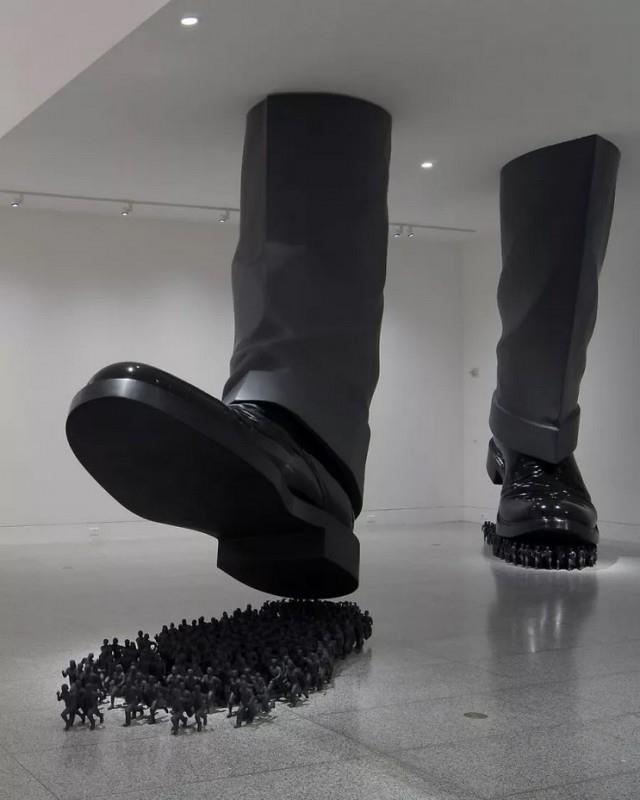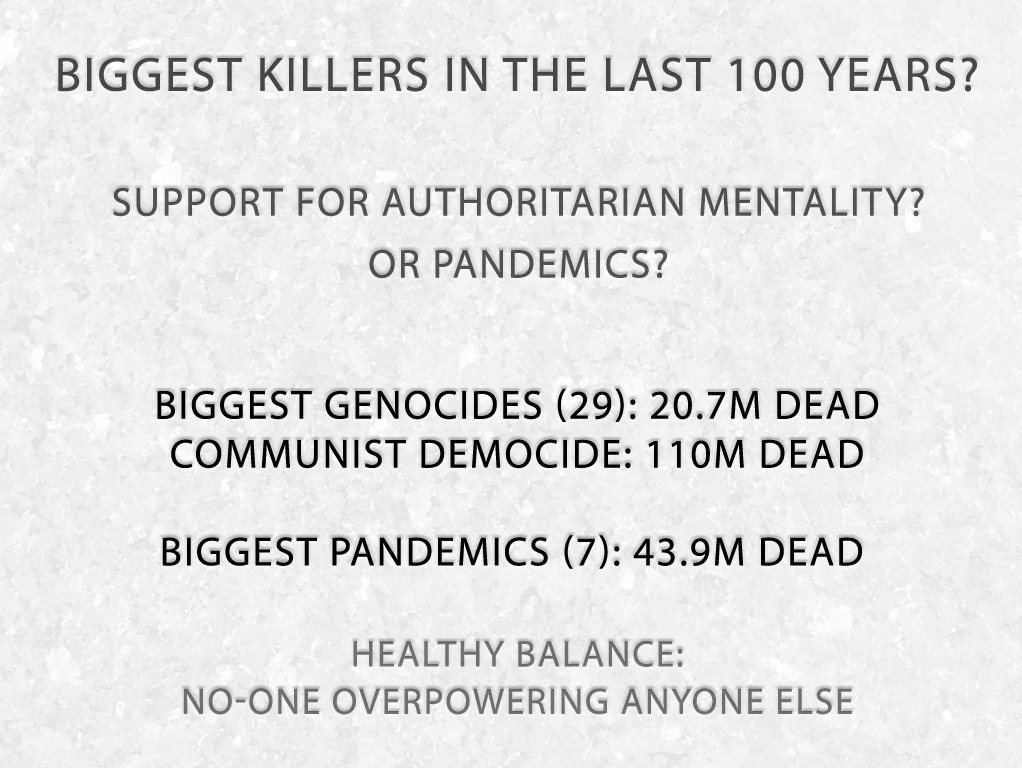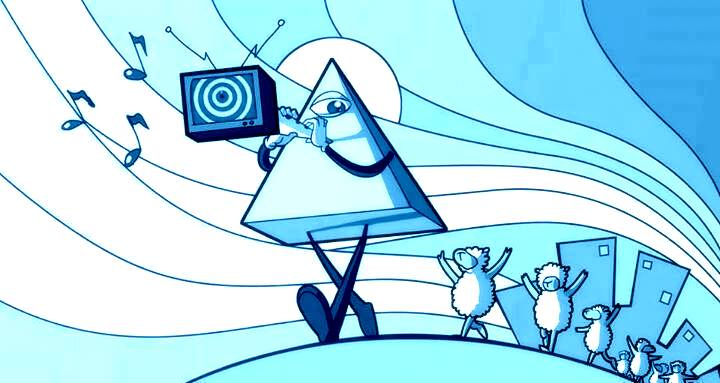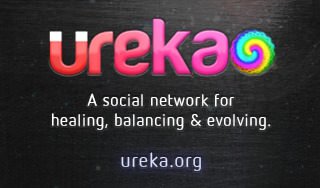Thousands of years of struggle to achieve peace and understanding on Earth have led to this moment, yet we often seem to be no closer to success. People vie for supremacy, often in the name of 'justice', often aiming to stop conflict in society by increasing levels of control in 'just the right way' (their way). In doing so, they have fed power into society's artificial power pyramids without noticing that the pyramid they seek to climb or use is actually part of the cause of their problem. Decentralisation has the answers...
I have written many times about the effects of centralisation within organisations and how it tends to lower the level of ethics and the quality of the actions taken by the people involved. Now I want to be more clear than ever - Centralisation of power opens the door to evil and only decentralisation of power can close it.

Power Doesn't Corrupt, Heartlessness Corrupts
I previously wrote at length to describe why the phrase 'power corrupts' is totally false. In fact, it is not only erroneous - it is suspiciously shaped in such a way that it looks like a weaponised idea that is intended to disempower people (see my linked post for more on this). We need power simply to live and to survive and it is possible for us to evolve to a state of non corruption - while retaining just the right amount of personal power.
Similarly, 'Centralisation' (as a way of organising a system or group of people) is another idea that is widely used and accepted as valuable - yet which is highly problematic and not generally being questioned enough to know whether it is flawed or not.
History shows us that, over and over again, both 'corrupt use of power' and 'centralisation' tend to go hand in hand. The largest examples of mass human death in the last century come not from pandemics, but from mass killings by centralised governments.

Genocide, enslavement, power theft and generally overriding the needs of others are all examples of heartlessness. Our heart is our natural empathic 'centre', where thought and emotions can bond in productive ways - if we allow it. When thoughts skip over emotions, we have unfeeling and cold logic that cares nothing for real needs. The misuse of power starts with heartlessness and the thinking it perpetuates.
Where do we go once we have started to amass power, while possibly stealing/receiving it from others (usually while claiming we are doing so 'in everyone's best interests')?
We centralise that power into structures that help us to maintain it and to use it to our advantage. This is precisely what empire builders are doing when they create huge armies to dominate other areas, killing their way towards implanting the population with rules and regulations that disempower them and benefit the empire builders. It's also essentially what monarchies and warlords have done for a very long time too - though the passage of time obscures this in some cases.
"But not all centralisation is evil though" - I hear some people proclaim. Well.. voluntary centralisation is possible, that's true - however, centralisation ALWAYS results in a loss of power within some individuals and they generally always discover at some point that they really needed that power - which is why they had it in the first place.
All power loss is a problem that always leads to imbalance and which opens the door to evil. It may take generations, but eventually, the inability to act purely for self interest, WILL result in death and suffering of those who have lost power. Some of our needs MUST be met by us ourselves and we need the power to do that.
You are the saviour you have been waiting for
Decentralisation of Power
While many people are becoming aware of DEcentralistion in terms of technology (e.g. blockchain technology, Bitcoin, Hive, Ethereum etc.), I want to focus more here on decentralisation of power, rather than just technology.
The dictionary definition of 'power' is essentially 'the ability to act'. So, here, I am describing 'decentralisation of the ability to act'.
I'm sure by now that most are able to see why centralisation of power is a problem. Isn't 'the ability to act' (to take action) something that we all need? Might it not cause some problems for us if 'ability to act' is all piled up into the hands of a centralised group?
While centralising food shopping into 'convenient' mega malls that buy up massive stock at low prices sometimes seems beneficial - it comes at a long term cost. In the short term, you get a standardised experience, with measured quality and low/competitive prices. However, behind the scenes, the power of people across the world has been compressed into the structures designed with the optimisation of the mega corporation's profits in mind and many people have lost their own power as a result.
In our supermarket example, suppliers and customers involved have reduced 'ability to act' when it comes to negotiation and choosing the level of variety in their food supply because the corporation has a hierarchy which doesn't respond to 'the little people' in the same responsive way that is possible when power is more spread out among smaller, local groups.
While your ability to pick from 10 types of cucumber instead of 2 might not seem evil, there are countless stories of the way that worker rights are eroded by large corporations twisting the arms of suppliers in a variety of ways to lower prices. Such manipulation isn't so possible when suppliers have a wide array of retailers to sell to.
When people are stuck in a situation where their work is devalued and a relatively small group of other people are able to benefit as a result, the result tends to be mega riches for the small group and potential destitution and hard decisions for the workers.
It's not the local corner store that has ambulances on call outside of it's premises for when it's workers get too hot, pass out and maybe die. It's also not the local corner store that has employees wearing diapers while they work in order to meet performance goals. In both of these cases, it was Amazon - one of the world's most 'wealthy' and centralised business structures that was responsible.
Decentralisation helps us recover lost power and take actions to ensure each individual has sufficient power to get their needs met, without them having to bow down to a central hierarchy who may or may not listen to them.
Pyramids of Powerlessness

The centralised structures that 'empire builders' direct are designed to prevent the need for them to deal with 'the little people' directly and prevent the kind of reciprocal communication and responsiveness that completely honest communication requires.
At the micro level, this results in every day annoyance to many people, but at the bigger level can set the scene for massive power to accumulate in the hands of a small number of people - who can then commit huge crimes, often without being noticed.
We can point to numerous events in history where this has been made extremely obvious, from the slavery of many people that built the Roman empire, to the slavery of many people that helped build the Nazi German empire and the slavery of Africans and others who helped build the British and American empires... There are many examples of many cultures trying to use slavery and evil to further their agenda.
Even in cases where people are passionately invested in trying to right the wrongs of such evil, the attachment to power pyramids continues, completely denied. People are so convinced (conditioned) in some cases, that centralisation is 'good' that they never question whether they are actually part of the problem.
Take this quote from a BBC interview from a few years ago with an activist who created controversy online by stating that:
All white people benefit from racism, with white privilege.
Many people became polarised by this statement since it implied that they were either victims or perpetrators in a giant racial war - whether they liked it or not. What no-one seemed to notice is that the very next words contained the key to a much larger piece of the puzzle and an actual solution.. Which was never mentioned or thought about.
If you are not dismantling racism, if you are not going to pull people up from the bottom of the pyramid, to the top - then you are participating in and benefiting from racism.
What was missed is that YOU CANNOT SOLVE INJUSTICE IN A POWER PYRAMID. As soon as you take people from the bottom and put them at the top, you have achieved precisely NOTHING. The only significant change that this could lead to would be if the power pyramid itself were completely dismantled.
See original video:
This realisation of the need for structural change is perhaps part of why we see groups such as BLM (Black Lives Matter) controversially advertising themselves as Marxists (commented on in numerous mainstream articles) - they seek to destroy empire - rather than strictly focusing on racial issues.
The answer isn't communism
The answer isn't communism
The answer isn't communism
I'll say it again for the hard of thinking -
The answer isn't communism
I have to repeat this because people are so heavily conditioned to think and feel that any criticism of 'the system' can only come from people pushing communism. I am not pushing communism, I am a systems engineer and information scientist promoting rationality and harmony. I am also one who has focused specifically on the fine art of understanding free will for many years, something that communists (and many capitalists) seem to have failed dismally at or never even bothered to start understanding at all.
Since the nature of the problem is power loss, a loss of freedom and a loss of the free will of individuals - any answer must not only correct these issues but cannot come simply from one person. I can point out the problem and I can identify an ideal system, but ultimately if my system doesn't feel good to you - then don't use it and your actual rejection of my idea is itself part of the solution! This is the literal opposite of authoritarianism - I am promoting your own self empowerment, not telling you how to live!
Ignorance or Evil?
Even the least curious among us are sometimes forced to admit that the actions of governments and corporations that we are told are 'on our side' and are 'looking out for our best interests' seem suspiciously like they are intended to achieve the opposite. I'm not pointing to actions that just seem to have been poorly thought out, but actions which seem to be deliberately intended to exploit or harm us. Lacking all the details, we tend to want to trust that these people are inherently 'good'. This means we tend to assume that what looks like exploitation is actually just ignorance on their part or some kind of mistake.
It is this, our inherent trust and uncertainty, that the most manipulative people use to their advantage. They know from experience that just the right amount of money, intimidating social status and repetition can convince many people that what they are seeing is based in integrity/truth and not simply deception and lies.
The pryamid structure of centralised organisations is guaranteed to create situations where the people at the top have much more power than everyone else - this is obvious, it is not ignorance - it is deliberate and by design. The intention of the pyramid system designers is to hoard power for themselves, which inevitably harms others in the process since there is not an infinite supply of power for them to draw on. So that only leaves us with 'evil' as an explanation, since to deliberately take action that causes suffering for others is essentially evil.
Empire building, pyramid makers use a centralised structure to break up work among a large number of people, while ultimately retaining the ability to direct all of the action from one board room or centralised office/mind. The pyramid shaped structure of their organisation means that their intent to corrupt the free thinking world for their own personal gain requires them only to corrupt a small number of people - who then corrupt more, who then corrupt more and on it goes.
We need look no further than the billions in US dollars paid out by pharmaceutical, 'health' and other corporations for serious crimes in only the last few years. Some of the biggest fines ever levied against anyone are to such groups - specifically for fraud and medical/scientific lies. In fact, most of the manufacturers of COVID19 vaccines are among these mega liars! People no doubt lost their lives due to the lies of these companies - yet they continue to prosper on a massive scale and are even haled as heroes by half the world today.
This is a good example of a collection of testimonies from pharma industry insiders, describing the level of criminality involved that has become normalised (can you say 'prostitutes and cocaine for doctors in exchange for prescribing drugs'?):
These groups use their massive wealth to buy off scientists, doctors and others in order to use their positions to mislead the world and make profit (plus accumulate power). This is evidenced by numerous court cases, whistleblower testimonies and the obvious daily experience of millions of people.

The average scientists at a pharmaceutical research company or the average doctor/nurse does not want this kind of greed based activity, they want to help people heal. It's the 'thinkers' at the top of the pyramids that design and profit the most from all of this.
Enter Decentralisation
Decentralisation takes the pyramid structures and turns them into something that might resemble a circle or simply a structure that is more balanced than a pyramid. While there may be groups or individuals within a decentralised structure that have more power than others, the design of the rules of the structure itself are not intended to be skewed in any particular entity's favour.
A decentralised food supply chain may involve each 'consumer' becoming a producer, for example - so that they have food grown on their own property (or nearby). This eliminates much of the unfair power accumulation of the mega corporations and can also allow for a wider range of crop types being grown and at higher qualities (assuming the people take care when growing). Further, the system might include ways for everyone to access tools needed to grow their own food - so there is a low barrier to entry (or no barrier) - leading to true inclusion and decentralisation.
Decentralisation in the digital world tends to mean blockchain technology at this point in history and blockchains are big business. Users of the Hive blockchain and it's many sub community sites are already well aware of how decentralisation can benefit them immensely. From censorship free social networking, to being directly paid for their posts in coins that they can use to buy things in the real world - the difference is like night and day when we compare Hive to the Facebooks and Twitters of the world.
Evil denies free will, ignores the feelings of others and at times seeks to deliberately harm others. These are all traits that the big centralised corporations are engaged in and are also traits that seem to always be present in centralised organisations (once they are big enough). From churches, to governments, to corporations, to social networks and schools - centralisation attracts those who intend to dominate others as they seek to gain power without regard for others' real needs. We can't truly know what other people need unless they know and then tell us. If we censor them, then by definition we are likely preventing them getting real needs met.
Decentralisation, meanwhile, generally allows for each individual to be supported much more than centralisation can really allow. If there is a shortage of power in a decentralised system, it tends to begin locally and nearby members of the network can pitch in to help.
As each participant is autonomous, how much help they give to others is voluntary and so balance can be maintained - without overriding individuals in the name of some kind of amorphous concept of 'group needs'. It is in the interests of network members to help each other as they could easily find themselves in the same situation and need help. Equally, the network relies on it's collective strength to thrive and so it's collective health is in the interest of all of it's members.
This is the opposite to centralised organisations, where the system controllers will often vampire power from everywhere they can before acknowledging that their actions are doing damage - even to the point of risking the entire society.
Whether those at the tops of pyramids manage to collapse everything, harming everyone, often depends on whether the rest of the community stops them. To stop them, they need personal power and it is decentralisation that maximises personal power and helps them to create harmony most efficiently.
Using the Hive social network and related sub sites is a great way to become familiar with the possibilities of decentralisation, so I suggest everyone start here to learn more in a practical way. It would be very exciting for schools to send students here to at least understand what decentralisation can look like, but it will take courageous souls to do so in an environment that is ever more centralised and domineering. Take heart, you are on the right side of history!
Let's co-create true freedom in the way that feels best to us, while including the needs of others carefully.
Wishing you well,
Ura Soul

Read My User Guide for Hive Here
View My Witness Application Here
View Some of My Witness Related Posts
Note: Witnesses are the computer servers that run the Hive Blockchain.
Without witnesses there is no Hive blockchain or DApps such as PeakD and 3Speak... You can really help Hive by making your witness votes count!
Posted Using LeoFinance Beta



This was a beautiful article! I don't dispute the goodness that a "good" central government can achieve, but I believe decentralization is a bit better for freedom.
A mix of the two however would, in my opinion be the best, where there's enough centralization to remove scams, but enough freedom that we can all live without fear.
Great post again!
Posted Using LeoFinance Beta
Thanks! I am personally yet to see clear evidence that a 'better' government can achieve things better than a 'no government' would do - but we don't have a lot of data to go on because... governments don't tend to give up and go home - even as a friendly experiment.
I am reminded of the quote by Dan Larimer, co-inventor of Steem and EOS - his aim is to 'make governments irrelevant'. To do that we have to create something better AND get it noticed/used.
I totally agree. Trying to find the optimal balance between "good" centralized government and decentralization is like trying to find the perfect balance of socialism and capitalism. Good luck with that!
I admire the commitment and quality of work that went into this one! Although I agree whole heartedly about the outcomes and consequences you point out, I have to disagree somewhat in regards to the causes.
In your second paragraph you talk about how centralization "lowers the level of ethics". I would argue that the lack of proper ethical guidance is what causes centralization to be manipulated and twisted to set personal interests ahead of the needs of the community at large. Everything you speak to here can be traced back to this fundamental cause by sound logical analysis.
Every collective whether it be a business enterprise, community, society or nation needs a certain level of leadership. Without such everything is anarchy. However when such leadership is allowed to apply self-serving self-interest rather than a communal-focused self-interest the results are exactly as you have described, every time. This is where proper ethical principles come into the game.
When and only when we choose to make sound ethical principles the basis of our legal systems (which includes all aspects of government/leadership) will we be able to start moving towards a more just society. My most recent post, The Nature and Purpose of Law, addresses this in more detail.
You also talked about the 'evil' that the historical record shows us repeatedly. Here again you are correct. My contention is that self-serving self-interest (the Me First mindset) is the face of that evil. Me First must, as a matter of logical deduction, always devolve to "I will throw the world under the bus so long as I come out ahead". This is the path of the dark side.
A communally focused self-interest on the other hand recognizes that "my interests are best served in the needs of my community". This view naturally recognizes the need for a proportional benefit between the individual and the community. And it is sound ethical principles that make such a position possible.
As always a fan of your work and hopes that together we can trigger a dialogue with a larger audience and get the movement started. Looking forward to more of your work.
Blessed Be.
Aloha! Thanks for your thoughtful response here.
One of the most common misunderstandings and judgements in modern society is against 'anarchy'. Many people relate to anarchy as 'dangerous' or 'selfish', when in truth it means only one thing 'no rulers'. This means that we all choose our own destiny without pressure from others - however, a requirement of this is that we don't pressure others too. We cannot have anarchy while anyone is pushing anyone around or telling them what to do. As soon as someone is violent to someone else, anarchy has ended. This has been drastically distorted in society by empire builders as they understand that 'the people' valuing anarchy means the end of their fun game of enslavement.
It's understandable to think that 'just the right amount of rules and control can bring peace' or can direct centralisation in the 'right' way. However, closer inspection uncovers that there is no way to do this without some voices being squashed in the process. Even the direct democracies of ancient cultures, which were far more balanced than todays phoney 'represenatational democracies', were still ultimately the vote of the majority against all minorities.
As long as there are 'leaders' directing the will of others, then the will in others is denied to some extent and this is not balance.
Balance is 'no part or aspect overpowering any other'. While there is centralisation there is overpowering, by default - it cannot be escaped.
Since it is pretty rare for true decentralisation to be seen on Earth (almost never), it is totally understandable that we will default, mentally, to the conclusion that some centralisation is needed. I am simply saying I disagree. :)
I think we are not using the term 'centralization' in precisely the same manner. I agree with your assessment regarding the general understanding of anarchy and am myself aware of its proper definition. What you describe here is almost exactly what Immanuel Kant presented with his Kingdom of Ends. This principle is a logical product of the Categorical Imperative.
To my mind good leadership does not direct the will of others but rather the organization of action taken for the benefit of the collective. When leadership follows sound ethical principles the outcome is good. Unfortunately this almost never happens. I make this distinction: A Ruler is someone who wears a mantle of authority and only takes up responsibility when circumstances force them to, a Leader wears a mantle of responsibility and only takes up authority when situations require them to.
I am making an educated guess that employees in your business ventures enjoy your leadership. The question I would ask is could your ventures function and provide the benefits (for all involved parties) without good leadership such as you provide. This is what I think of when I use the term 'centralization'.
Good to know, thanks - I haven't really studied well known philosophers.
The nature of will is such that any organisation of action that others participate in is inevitably also an organisation of the will of the others and direct pressure or direction of that will. There's no way around that. Just as it is rare for a leader to be ethical, it is also rare for a 'follower' to be completely aligned on all levels with the action they are given. They may feel slightly annoyed that they are doing some sub part of it - or annoyed that the leader has a certain tone that day - or whatever it is - they all create subtle or gross waves within the will that are repulsed by the commands from the leader. Typically, these impulses to dissent are denied and go undercurrent, causing the formation of sub and unconsciousness (plus discomfort and discontent). This is a big topic!
That's a great distinction, yes - that's probably the best we can do with these roles.
That's an interesting topic because I try to not have subordinates. I don't have any employees, I simply hire for short term needs as required. I see the people I work alongside as equals. In some ways, the fact that I am 'at the top' is just due to the way that it is unavoidable for someone to be at the top using the corporate businesses structures that society relies on. If I do make decisions 'for the company' then people can either go along with it or not - I aim to have zero control over them and to put up zero friction for them to move away if they want to.
Without me directing the business there wouldn't be a business. May aim when working with others is to either learn from their expertise or to pass on my own, so that we all become multi skilled and more able to help each other out. There isn't really a need for hierarchy and subordination in that, though I do realise that what I am describing isn't necessarily going to work in all situations in a similar way - such as where an architect works with 100 builders, most of whom are doing straightforward labour tasks that don't involve advanced physics and maths.
To distinguish more helpfuly here, I am highlighting the problem of individual will being over-ridden and putting it in the context of centralisation. Since centralisation is the default at the moment and always results in loss of personal will, I perceive that shifting the default to decentraliastion is worth a shot - in order to save the will from it's plight. The issue then becomes one of how groups of people can co-operate without being overridden. Completely voluntary interaction is a requirement for this and through denials and ingrained (dysfunctional) patterns, the centralised structures tend to always fail to prevent coercion etc.
I don't think/feel there is a solution to this other than each individual in society being self empowered. I think the result of that would naturally be decentralisation. :)
Thanks for the clarifications, I think I'm getting a better picture. I made the mistake of assuming your business was larger than a one person shop and I applaud your chosen path. I am a staunch proponent of individuality and promoting those around me in the hopes of a better world for all.
It seems to me that what we have discussed so far, the contrast between centralization and decentralization, is almost identical to that between dystopia and utopia. It also seems that we have at least some agreement that the dystopia of centralization is a very bad idea and that the utopia of absolute decentralization isn't feasible. For myself I have always sought what Aristotle called the Golden Mean or the middle way. And I believe this is in keeping with seeking balance.
In your reply to @eternaldreamer's comment you say, "We all have our own natures and not everyone shares a single 'human nature' by any means". I would contend that there is in fact a universal human nature, the very fact of being human is a commonality that suggests this, but as each of us is a totally unique expression of being human we each have a completely unique Character. This is precisely what the philosophical study of ethics is all about. In fact one of the 'laws' of human nature would have to be our individual uniqueness, which gives rise to the common argument that there is no universal human nature.
Also in that same response you point out the 'pyramid' of your Ureka.org community, Healing, Balancing and Evolving. I like it! That is a very simple analog to Abraham Mazlow's Hierarchy of Need, another pyramid which has Self Actualization at the top. The question that I believe we are trying to answer here is how can individuals effectively promote a paradigm shift that will allow for a positive evolution of society while maintaining balance between collectivism and individualism? The Hive ecosystem is an awesome start but what can we do to amplify and accelerate the movement?
"...how can individuals effectively promote a paradigm shift that will allow for a positive evolution of society while maintaining balance between collectivism and individualism?"
I think that's a very good way of phrasing the question. Or, how can we facilitate an intellectual and spiritual evolution that will ultimately render both centralized government and centralized economy obsolete?
Bravo!! Excellent post, and I look forward to reading more. There are a couple little details I don't entirely agree with, or perhaps I'm not understanding your position correctly. For instance
"|Well.. voluntary centralisation is possible, that's true - however, centralisation ALWAYS results in a loss of power within some individuals and they generally always discover at some point that they really needed that power..." I don't see how the total elimination of centralized power is possible, given that the majority of all social animals - including humans will tend to gravitate towards a few leaders. Mankind would need to evolve past this natural tendency in order to eliminate the need or desire for at least some centralization of power. That said, if the centralization of power in this instance is completely voluntary, then the person(s) giving up that power can take it back whenever they want or need it.
But on the whole I think I see where you are going with this. I am of the opinion that the purpose of LIFE is to grow and evolve. That is our raison d'être. We can only do that in a state of liberty. Every little freedom and bit of power we cede to others - or they take from us - reduces our potential for growth until eventually it results in stagnation. On an individual basis this reduces our lives to mere existence. On a species level, it might eventually lead to extinction.
Forgot to mention I voted for you.
Thankyou!
Greetings! Yes, I agree that a fundamental for us is to evolve. I include that intention along with healing and balancing. These three form a very strong, self reinforcing 'pyramid' ironically!
We all have our own natures and not everyone shares a single 'human nature' by any means. If we did, then there couldn't be any leaders as we'd all either be leaders or followers - the fact that we have both shows that we don't all have the same nature.
I am suggesting evolving our own nature to a state of balance where we are united as one, yet individuated simultaneously. The guidance we need can come from the inside, from the feelings that are deeply rooted in self and the Earth - plus beyond. We have an inate, internal compass - unfortunately, it is damaged in most people at the moment due to long standing denials.
That's true in some cases, however, sometimes it isn't obvious how to recover the power and some time people don't want to give it back. I can voluntarily agree to be 'ruled' by a government but strangely enough they seem to not want to stop doing it. ;)
Your final observation is correct. Since we literally die if we give our power away, it is imperative that we stop doing it and then heal, balance and evolve. It's not possible to know in advance what the outcome of such deep changes will be, but we can know right now that change is needed and is coming. :)
"the phrase 'power corrupts' is totally false"
I think you have misquoted that phrase. It is actually "Power tends to corrupt, and absolute power corrupts absolutely", which is true. It doesn't say power always corrupts. It does say absolute power always corrupts absolutely, which can't be denied. The author was careful to choose his words. Your simplified version of the phrase ("power corrupts") is indeed false, but you are the only one using that phrase.
Did you read the linked post on that topic, the very first line addresses the difference between the two quotes and the rest of the post explains the issues in depth.